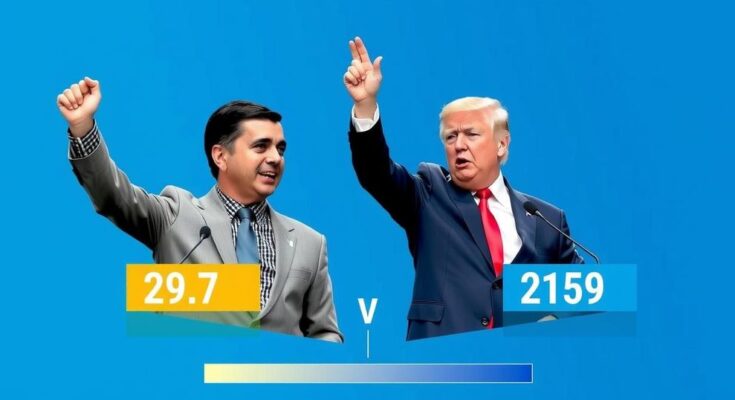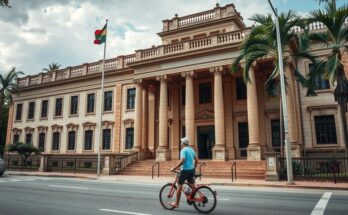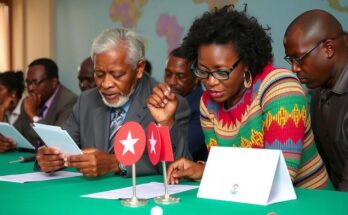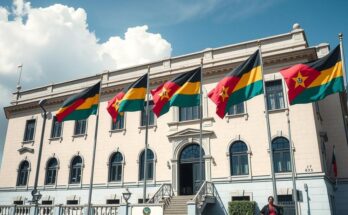Uruguay’s presidential runoff features a close contest between Álvaro Delgado and Yamandú Orsi after no clear majority was established in the first round. The election reflects themes of economic policy, public safety, and the legacy of previous administrations, with candidates proposing diverging strategies in addressing voter concerns. Amid a backdrop of political ambivalence, the election underscores Uruguay’s democratic resilience and challenges ahead.
Uruguay recently engaged in a significant electoral contest as citizens participated in a second round of voting to determine their forthcoming president. The election saw the conservative ruling party facing a formidable challenge from the left-leaning Broad Front coalition, reflecting a polarized political landscape following an inconclusive initial vote. Álvaro Delgado, representing the National Party, and Yamandú Orsi of the Broad Front, emerged as the primary candidates, each inheriting unique legacies and public scrutiny.
In the first round of voting held on October 27, Yamandú Orsi’s Broad Front received 44% of the votes, while Álvaro Delgado’s National Party garnered 27%. Additionally, the conservative Colorado Party captured 20% of the vote, positioning Delgado advantageously in the runoff. This context has resulted in an evenly split Congress, with an imminent decision between candidates whose platforms reflect contrasting approaches to governance and social issues.
The candidates have focused on pressing topics such as rising crime rates that alarmed many in this traditionally secure nation, with Delgado advocating for stringent crime policies and a new maximum-security facility. In contrast, Orsi promotes a community-based strategy for crime reduction. Delgado has pledged to uphold the legacy of the current administration, suggesting that this election serves as a referendum on President Luis Lacalle Pou’s leadership, which boasts favorable economic indicators and approval ratings despite previous challenges.
Orsi, perceived as an ideological successor to former President José Mujica, seeks to revitalize leftist strategies while maintaining a pragmatic stance on investment and social security reforms. There exists a potential divergence from radical changes, as he has hinted at fostering a “new left” in Uruguay. Mujica, originally known for his progressive policies, contributed to the nation’s reputation for social liberalism and sustainability during his presidency from 2010 to 2015.
Both candidates operate in an election characterized by a consensus on several key issues, resulting in voter ambivalence and a significant portion of undecided citizens even at this late hour. Analysts have noted that the absence of inflammatory tensions, such as those observed in other democracies, underscores Uruguay’s resilience as a functioning democracy. “This is a normal election, which is rare,” emphasized Nicolás Saldías, reflecting on the overall stability and democratic strength of Uruguay.
To summarize, Uruguay’s current presidential runoff encapsulates a blend of emerging challenges and political legacies as candidates chart divergent courses in addressing socio-economic issues, the implications of public safety, and the legacy of previous administrations. The outcome not only reflects party dynamics but also reveals the delicate balance of electoral sentiments within the Uruguayan populace.
Contextually, Uruguay’s political landscape has shifted significantly following the 2019 elections, where the center-right coalition triumphed, marking a departure from 15 years of leadership by left-leaning parties. The impact of prior reforms, including the legalization of same-sex marriage and abortion, remains profound even as the current climate brings new challenges, such as a surge in violent crime. Both former and current administrations present contrasting responses to these socio-political dynamics, influencing voters’ choices and perceptions ahead of the presidential runoff. This election is particularly noteworthy due to its showcase of formal democratic processes amidst a backdrop of voter indecision, reflecting broader socio-economic concerns prevalent in Latin America.
In conclusion, the presidential runoff in Uruguay illustrates a multifaceted political scenario characterized by competitive party dynamics and pressing socio-economic issues. As the country navigates challenges such as crime rates and economic strategies, the candidates’ differing visions for governance may significantly shape the nation’s future. The sustained focus on democratic processes amid voter ambivalence serves as a testament to Uruguay’s longstanding commitment to robust political engagement and civil discourse.
Original Source: www.voanews.com




